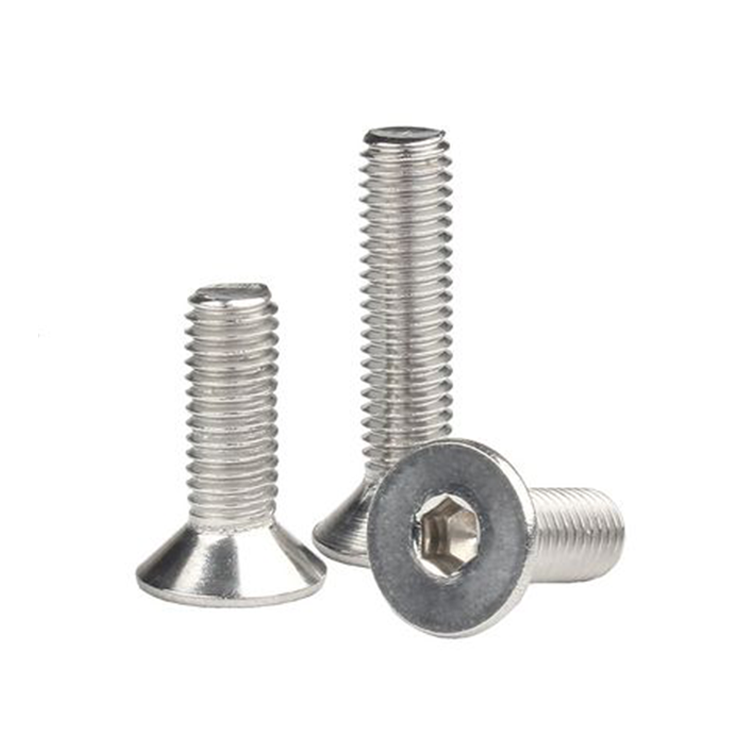

When it comes to precision engineering, every component must meet the highest standards for quality, strength, and performance. One such component that plays a crucial role in achieving these standards is the countersunk hex socket screw. This specialized fastener is designed to provide both functionality and aesthetics, offering distinct advantages for a variety of precision applications. In this article, we'll explore why countersunk hex socket screws are highly valued in the field of precision engineering and how they contribute to creating superior products.

A countersunk hex socket screw is a type of screw that features a conical-shaped head designed to sit flush with the surface when fully installed. The screw has a hexagonal drive, making it easy to tighten or loosen with a hex key or wrench. The key distinguishing feature of this screw is its countersunk head, which allows for a cleaner, more seamless finish in applications where surface smoothness is essential.
One of the main advantages of countersunk hex socket screws is their ability to provide a flush finish. This is particularly important in precision engineering, where the aesthetics and smoothness of the surface matter. The countersunk head allows the screw to sit perfectly within the surface, eliminating protrusions that could interfere with other components or create an unattractive appearance. This is ideal for high-precision applications, such as electronics, automotive parts, and aerospace engineering, where both functionality and visual appeal are critical.
Countersunk hex socket screws are not just about looks – they are also engineered for superior strength and durability. The hexagonal socket drive ensures a secure fit, providing higher torque transmission compared to traditional slotted or Phillips-head screws. This makes it easier to apply the correct amount of force without stripping the drive, which is crucial in precision engineering where tight tolerances are often required.
Moreover, the shape of the countersunk head distributes the load more evenly, reducing the risk of damage to the material being fastened. This contributes to the longevity and reliability of the assembly, ensuring that components stay securely fastened even in high-stress environments.
In precision engineering, the alignment of parts is essential for ensuring that all components function properly. Countersunk hex socket screws are designed to fit tightly into countersunk holes, which allows for better alignment of parts. This is especially important in industries like aerospace or automotive manufacturing, where even the smallest misalignment can lead to catastrophic failure.
By using countersunk hex socket screws, engineers can ensure that each part is correctly aligned, leading to better performance and greater reliability of the final product. This precise fit is difficult to achieve with other types of screws, making the countersunk hex socket screw an indispensable tool in precision engineering.

When using standard screws, the protruding head can cause damage to surrounding materials or components, especially when they need to be fitted closely together. However, countersunk hex socket screws eliminate this problem. Their flush design means they won’t interfere with adjacent parts or surfaces. This reduces the risk of scratches, dents, or other forms of damage, which is particularly important when working with delicate materials like composites or thin metals.
This feature also reduces the likelihood of accidental contact with moving parts, which could otherwise lead to wear or malfunction. Therefore, using countersunk hex socket screws in precision engineering not only enhances the durability of the screws but also protects the integrity of the materials being assembled.
In many precision engineering applications, safety is a top priority. Because countersunk hex socket screws sit flush with the surface, they are less likely to catch or snag on tools, equipment, or other parts. This smooth, flush design helps minimize the potential for accidents during assembly or operation, making it an ideal choice for environments where safety is paramount.
Furthermore, the tight fit and strong fastening capability of the hex socket drive reduce the chances of screws loosening over time. This helps maintain the structural integrity of the assembly, contributing to the overall safety of the product.
Countersunk hex socket screws are incredibly versatile and can be used across a wide range of applications. Whether you're designing an intricate piece of machinery, assembling a consumer electronics device, or creating a custom automotive part, these screws can meet the needs of various engineering disciplines.
They are available in different materials, including stainless steel, carbon steel, and titanium, allowing engineers to choose the right option based on the specific requirements of their project. The ability to use these screws in both standard and custom applications makes them an invaluable component in precision engineering.

The countersunk hex socket screw is a powerful fastener that offers several advantages in precision engineering. From its ability to provide a smooth, flush finish to its strength, durability, and alignment capabilities, this screw type is an excellent choice for projects that demand high standards of quality and performance. Whether for aesthetic reasons, structural integrity, or safety concerns, countersunk hex socket screws contribute to building products that stand the test of time and operate flawlessly.
Incorporating these screws into your next precision engineering project could make all the difference in terms of performance and longevity. So, the next time you need a screw that combines both form and function, consider the countersunk hex socket screw for your assembly.